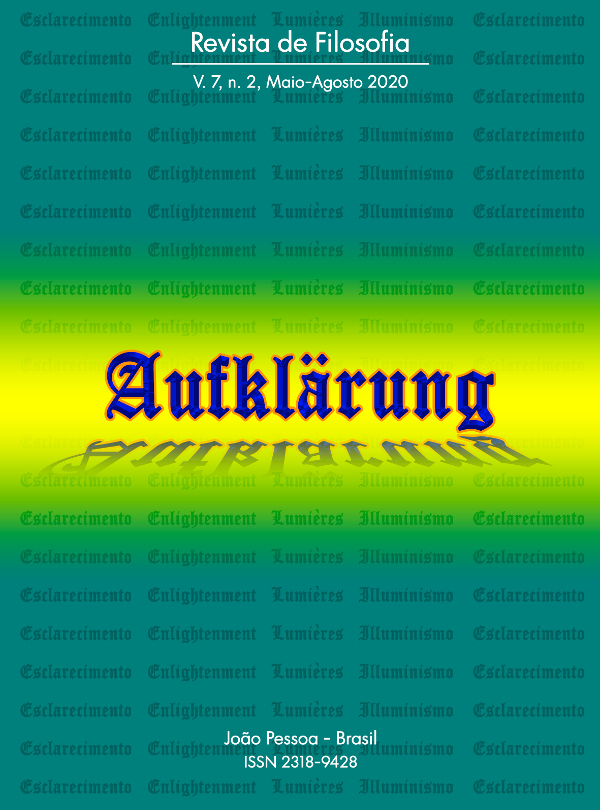The non-intellectualist thought as sythesis between the metaphysiscs of act and the metaphysics of representation
DOI:
https://doi.org/10.18012/arf.v7i2.55824Keywords:
Act, Representation, Objectification, Consciousness, Thought, Non-IntellectualismAbstract
The metaphysics of the act defines reality as dynamism and performativeness. The metaphysics of representation conceives the being as an object identified by consciousness. Establishing a bridge between these two metaphysics, or in still other words between difference and identity, process and objectification, is equivalent to integrating action and thought. To achieve this, we consider necessary to defend the existence of a non-intellectualist and non-objectivating consciousness that possesses a thought that forms part of one’s own becoming.
; ; ; ; ; no
Downloads
References
DILTHEY, W. (1911), Die Typen der Weltanschauung und ihre Ausbildung in den metaphysischen Systemen, Gesammelte Schriften, Band 8: Weltanschauungslehre, Stuttgart: Vandenhoeck & Ruprecht, 1977.
FICHTE, J. G. (1794), Einige Vorlesungen über die Bestimmung des Gelehrten, Fichtes Werke, Band VI, Berlin: De Gruyter, 1971.
FICHTE, J. G. (1794-1802), Grundlage der gesammten Wissenschaftslehre, FW, Band I, 1971.
FICHTE, J. G. (1797a), Zweite Einleitung in die Wissenschaftslehre, FW, Band I.
FICHTE, J. G. (1797b), Versuch einer neuen Darstellung der Wissenschaftslehre, FW, Band I.
FICHTE, J. G. (1800), Die Bestimmung des Menschen, FW, Band II, 1971.
FICHTE, J. G. (1805), Über das Wesen des Gelehrten, und seine Erscheinungen im Gebiete der Freiheit, FW, Band VI.
HEIDEGGER, M. (1927), Sein und Zeit, Gesamtausgabe, Band 2, Frankfurt a. M: Klostermann, 1977.
HEIDEGGER, M. (1931-40), Platons Lehre von der Wahrheit, Wegmarken, Ga, Band 9, 1976.
HEIDEGGER, M. (1935), Der Ursprung des Kunstwerkes, Holzwege, Ga, Band 5, 1977.
HEIDEGGER, M. (1935-36), Die Frage nach dem Ding, Ga, Band 41, 1984.
HEIDEGGER, M. (1941), Die Metaphysik als Geschichte des Seins, Nietzsche, Ga, Band 6.2, 1997.
HEIMSOETH, H. (1922), Sein und Lebendigkeit, Die sechs großen Themen der abendländischen Metaphysik und der Ausgang des Mittelalters, Stuttgart: Kohlhammer, 1965, pp. 131-171.
HENRY, M. (1985), La généalogie de la psychanalyse. Le commencement perdu, Paris: PUF.
HENRY, M. (2012), Heidegger, Descartes, Nietzsche: Schopenhauer et le ‘courant souterrain’ de la metaphysique, Les Études Philosophiques, nº 3, pp. 307-317.
HUSSERL, E. (1912), Ideen zu einer reinen Phänomenologie und phänomenologischen Philosophie, Husserliana III/1, Den Haag: Martinus Nijhoff, 1976.
NIETZSCHE, F. (1885-86), Nachgelassene Fragmente, Kritische Studienausgabe, Band 12, München, De Gruyter, 1980.
NIETZSCHE, F. (1886-87), Nachgelassene Fragmente, KSA, Band 12.
RICOEUR, P. (1950), Philosophie de la volonté. Tome I: Le volontaire et l’involontaire, Paris: Aubier, 1988.
SCHOPENHAUER, A. (1819), Die Welt als Wille und Vorstellung, Sämtliche Werke, Band I, Frankfurt a. M: Suhrkamp, 1986.
SPINOZA, B. (1677), Ethica ordine geometrico demonstrata, Spinoza Opera, II, Heidelberg: Carl Winter, 1972.
Additional Files
Published
How to Cite
Issue
Section
License
Journal general policy
1.This journal works under a Creative Commons License aplied to online journals. That icence can be read in the following link: Creative Commons Attribution 4.0 International (CC BY 4.0).
2.Accordingly to this License, a)the journal declares that authors hold the copyright of their articles without restrictions, and they can archieve them as post-print elsewhere. b)the journal allow the author(s) to retain publishing rights without restrictions.
Metadata Policy for information describing items in the repository
1. Anyone may access the metadata free of charge at anytime.
2.The metadata may be re-used in any medium without prior permission, even commercial purposes provided the OAI Identifier or a link to the original metadata record are given, under the terms of a CC BY license refered for the Journal.







































